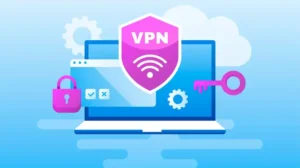AWS Site-to-Site VPN is a fully managed service that uses industry-standard encryption protocols like IPsec to create secure tunnels between your on-premises network and AWS VPCs. This ensures protection against threats like eavesdropping and tampering.
But is that enough to make AWS Site-to-Site VPN secure? In this article, we shall explore the key security features of this VPN service from Amazon. So, stay tuned with us to find out exactly how secure AWS Site-to-Site VPN is.

How Secure Is Site-to-Site VPN?
Amazon uses a shared responsibility model for providing security in AWS Site-to-Site VPN. While safeguarding the infrastructure used to run AWS cloud services is the responsibility of AWS, you are responsible for the laws and regulations applicable to your data.
Also, as part of the AWS Compliance Programs, Amazon lets third-party auditors inspect and verify their security. That’s not all, as AWS Site-to-Site VPN has more security components, as described below.
Data Encryption and Authentication
AWS Site-to-Site VPN uses Internet Protocol Security (IPsec) to prevent your data from being leaked. Due to such strong encryption standards, your data is likely to be safe even if bad actors get their hands on it.
Moreover, AWS Site-to-Site VPN supports authentication mechanisms like Pre-Shared Keys (PSK) and digital certificates. These are useful techniques for keeping malicious users off the network while providing robust authentication.
Data Protection
The shared responsibility model mentioned before extends to data protection in AWS Site-to-Site VPN. AWS takes the responsibility to protect the global infrastructure behind its cloud services. But for data protection, it is crucial to safeguard your account credentials and use AWS IAM to set up each user.
Here are more ways AWS recommends data protection via Site-to-Site VPN.
- Use Multi-factor Authentication
- Employ SSL/TLS 1.3 for resource communication
- Use AWS CloudTrail to keep track of user activities
- Enable AWS encryption solutions
AWS IAM
AWS IAM (Identity and Access Management) lets administrators watch over who gets authenticated and authorized to use Site-to-Site VPN resources. Even if you’re a service user, understanding how access is managed can help, especially when you try to figure out which permissions to ask from the administrator.
Amazon also has IAM users and IAM roles to control access on different levels. While IAM users are associated with specific persons, IAM roles are temporary, allowing one user to switch between roles. This unique feature is useful when providing or gaining temporary IAM permissions and for federated user access.
Resilience
Aside from the AWS global infrastructure, Site-to-Site VPN has features that aid data resiliency and backup. One such feature is the two-tunnel connection, which effectively increases availability to your VPCs. In case of a failure, your VPN connection switches to the second tunnel for an uninterrupted connection.
Besides, you can always set up a new Site-to-Site VPN connection if your customer gateway somehow becomes inaccessible.
Frequently Asked Questions
Is AWS Site-to-Site VPN IPSec?
AWS Site-to-Site VPN uses IPSec to establish a safe, encrypted connection between your AWS resources and your local data center.
Is AWS Site-to-Site VPN encrypted?
The short answer is yes. Each Site-to-Site VPN connection in AWS comprises two encrypted IPsec VPN tunnels with options for AES128 or AES256 encryption.
Is AWS Site-to-Site VPN private?
It is possible to make AWS Site-to-Site VPN private by enabling encryption over AWS Direct Connect transit VIFs, allowing the configuration of private IPs for end-to-end connectivity.
Summary
In conclusion, AWS Site-to-Site VPN is a secure and flexible solution for creating encrypted connections between on-premises networks and AWS VPCs. As shown in this article, it offers a range of security features to safeguard your data and network traffic. So, what do you think? Is AWS Site-to-Site VPN secure enough to incorporate into your workflow? Let us know in the comment section below.


![Read more about the article [Explained] Is AWS Client VPN Secure?](https://vpnaware.com/wp-content/uploads/2023/06/Is-AWS-Client-VPN-Secure-300x168.webp)
